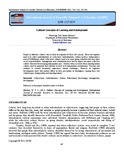| dc.contributor.author | Moalosi, W.T.S. | |
| dc.date.accessioned | 2013-04-04T08:18:24Z | |
| dc.date.available | 2013-04-04T08:18:24Z | |
| dc.date.issued | 2012-12 | |
| dc.identifier.citation | Moalosi, W.T.S. (2012) Cultural concepts of learning and development, International Journal of Scientific Research in Education, Vol. 5, No. 4, pp. 287-291 | en_US |
| dc.identifier.issn | 1117-3259 | |
| dc.identifier.uri | http://hdl.handle.net/10311/1131 | |
| dc.description.abstract | People in different cultures vary in their descriptions of their self-concept. These descriptions tend to be either individualistic or collectivist. Individualistic cultures preface independence and self-fulfillment, while collectivist cultures tend to be more group-oriented and carry more social responsibilities. Immigration and colonization have had an impact on many collective cultures that had lived among independent ones. Conflict often occurred when interdependent cultures tried to maintain their identity in their new independent environment. Teachers and students at schools frequently experience similar challenges. Theories of cognitive development show that parents differ in their perception of intelligence among these two cultural types (independent and interdependent). | en_US |
| dc.language.iso | en | en_US |
| dc.publisher | IJSRE, http://www.ijsre.com | en_US |
| dc.subject | Collectivistic | en_US |
| dc.subject | Individualistic | en_US |
| dc.subject | Culture | en_US |
| dc.subject | Educational psychology | en_US |
| dc.subject | Immigration | en_US |
| dc.subject | Development | en_US |
| dc.title | Cultural concepts learning and development | en_US |
| dc.type | Published Article | en_US |
| dc.link | http://www.ijsre.com/Vol.,%205_4_-Moalosi.pdf | en_US |

